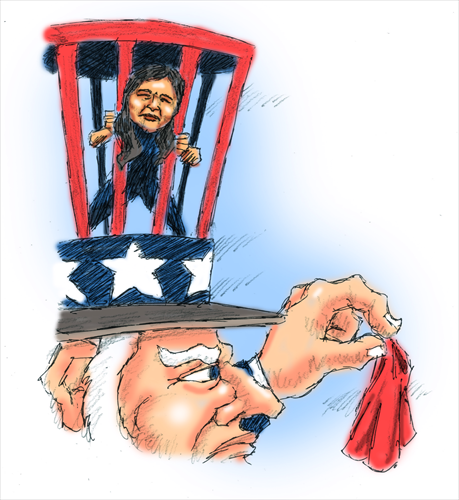Khobragade arrest risks damaging ties

Illustration: Peter C.Espina/GT
The current controversy over the arrest of Indian Deputy Consul General Devyani Khobragade may seem to be a tempest in a teapot, but it could have a long-lasting impact on US relations with India, especially if the situation is not effectively resolved.
The outrage this case has generated in India is not simply found among Indian government officials, but also has a very real grass-roots component, which could make it extremely difficult to move past this dispute, especially if Khobragade faces further legal action in the US.
Khobragade has stated that the actions of her maid Sangeeta Richard were part of a blackmail attempt, while prosecutor Preet Bharara claims that Richard was paid less than her employment contract mandated. Khobragade was then arrested in New York for making false statements and committing visa fraud. The question of her guilt or innocence will have to wait for a trial, although it is likely that the conclusions of the court will not put the controversy to rest.
For many Indians, the strip and body cavity search that followed Khobragade's arrest was nothing less than a slap in the face to the Indian people. The decision to incarcerate her in a holding cell with other criminals has only compounded the public and government anger in India.
Although the State Department claims that her diplomatic immunity does not cover these offenses, the Indian government disagrees with the US position. Most damagingly, Khobragade currently faces the possibility of a 10-year prison sentence should she go to trial and be found guilty.
The US and India have a close economic and governmental relationship, one bolstered by the fact that Asian Indians make up one of the fastest growing groups of immigrants in the US.
US claims that Khobragade's diplomatic immunity does not cover these charges make it impossible for Washington to simply expel her from the US without seeming to have backed down in the face of Indian pressure.
Equally, the specter that a senior Indian diplomat may be sentenced to as much as a decade in prison will continue to inflame public opinion in India. If Khobragade is found guilty and incarcerated, no matter how short the final sentence is, the consequences will be very detrimental to the working relationship between the US and India.
Much of the blame for this current crisis rests with the US. The current claim that Khobragade has been treated no differently than other prisoners ignores the very real diplomatic consequences produced by her arrest.
The crime she is accused of did not put anyone at risk, and could have been dealt with by the simple expedient of expelling Khobragade from the US. Such an action would have made the US' disapproval plain while minimizing the potential political damage from the affair.
Even if it was decided that arresting Khobragade was the best course of action, it could have been carried out in a far less humiliating manner, remembering again that arresting an accredited diplomat from one of the world's largest nations involves far different issues than arresting a local suspect.
Holding her in a separate area from the general population would simply have been recognizing that an incident could very well have serious consequences for US interests. This would have also eliminated the need for an intrusive search procedure.
At this point, the most urgent goal for both the US and India is to bring this affair to a close without producing an irreparable diplomatic or public breach between the two nations.
Because Khobragade's ability to function in the US has been compromised by these events, simply expelling her from the US would be a very wise choice. At that point, the US and India could enter into substantive talks regarding this issue without further inflaming attitudes in both countries.
Finally, the US should devise a more effective policy to deal with alleged cases of illegal conduct on the part of another nation's diplomatic staff.
Such a policy should ensure that law enforcement agencies understand that arresting or charging a diplomat is an action that should only be taken with careful consideration regarding the possible diplomatic consequences.
The author is a freelance writer based in Corona, California. charlesgray109@gmail.com